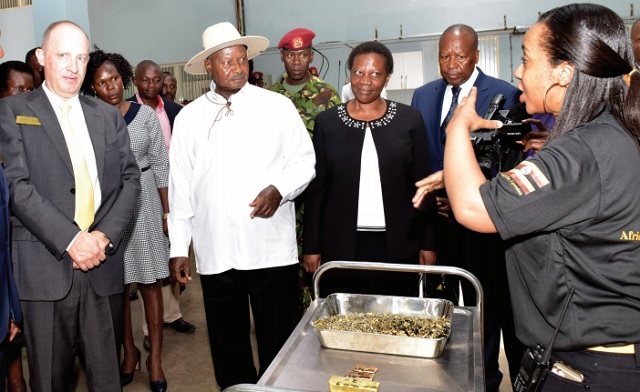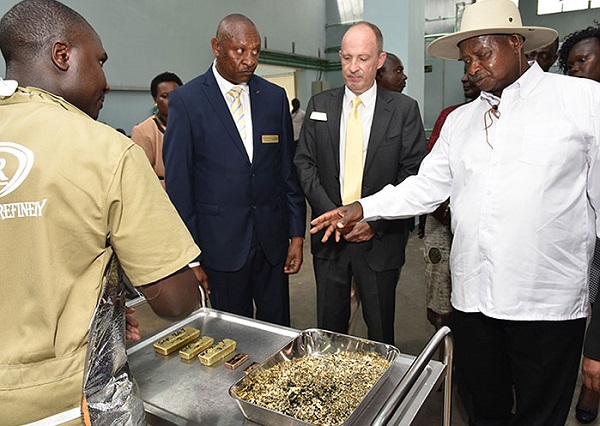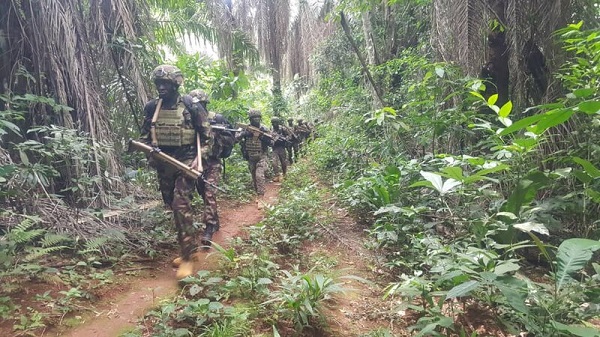
Angola peace talks renew search for solutions
COVER STORY | THE INDEPENDENT | Details about peace talks between the governments of the Democratic Republic of Congo (DRC) and Rwanda in the Angolan capital, Luanda, on Aug.20 remain scanty but it has not deterred pundits from insisting that without Uganda’s issues being considered, the international community should expect minimal progress.
The meeting between the foreign Ministers of the DRC and Rwanda was scheduled to talk about a peace agreement proposal presented by the Angolan President, João Lourenço, to Rwanda’s Paul Kagame and Félix Tshisekedi of DRC.
Lourenço handed the proposal to Kagame during talks held on Aug. 11 before his inauguration ceremony in Kigali. Lourenço then flew to Kinshasa the next day and met with Tshisekedi.
The meeting of foreign ministers is the third meeting and follows one which agreed to a ceasefire in force since Aug.04 having been agreed on July 30 under Angola’s mediation.
Even as efforts to secure a lasting cessation of hostilities continue, Congo experts like Prof. Kristof Titeca insist that understanding Uganda’s interest in the DRC is key.
In an essay entitled `Uganda and the DRC conflict: the interests driving Kampala’s involvement,’ Prof. Titeca argues that, in his view, Uganda’s main interests in the DRC are economic, but these are closely connected with political and security interests.
“Understanding them is key to the conflict in the region,” he says in the essay published on Aug.20 in the online scholarly journal, The Conversation. Prof. Titeca has researched and written extensively on Ugandan and DRC conflicts, including authoring books like `The Lord’s Resistance Army: Myth and Reality’ (2010), `Rebel Lives’ (2019), and ‘Negotiating Public Services in the Congo’ (2019).
His latest essay shows the increasing need to keep the international community and his readers glued to his research in the region. It is framed as a response to the July 2024 report by the UN Group of Experts on the DRC which stated that the Ugandan army and intelligence officials were providing active support to the M23 rebel group.
In seeking to highlight an “ambiguous and often tumultuous” relationship between Uganda and its western neighbour, the DRC, Titeca says this has made headlines in recent months. Unstated is the fact the report dwelt largely on old issues, and the headlines were largely to refute some of its findings.
The newsy element of the report were that during the period it reviewed, evidence emerged of frequent M23 and the Alliance Fleuve Congo (AFC) activities on Ugandan territory. The AFC leadership, including Corneille Nangaa, who recently resided in Kampala, held meetings with representatives of Congolese armed groups and individuals closely linked with M23. It said Nangaa and Lawrence Kanyuka benefited from the support of the Ugandan public figure Andrew Mwenda (also the Executive Director of Independent Publications Ltd) in approaching several embassies in Kampala in March 2024 to contest sanctions imposed on M23 leaders and to elicit sympathy for the cause of AFC and M23.
“Mwenda has long been known as the liaison between the Governments of Uganda and Rwanda,” the report says. Mwenda has since explained that his discussions with several western embassies in Kampala were not correctly represented in the report.
The Group of UN Experts on the Democratic Republic of the Congo was first appointed in 2004 and its mandate has constantly been renewed mainly due to delays in completing its work. Its latest tranche was renewed on October 12, 2023 with a mandate to submit its final report in February/March 2024.
It presented the report on May 31, 2024. The delays mean that the report generally has historical information. Prof. Titeca’s response also covers a lot of history.
Talking about the M23, it says the group, which is active in eastern DRC, was first defeated in 2013. But it has resumed hostilities in the vast area since 2021. It details how the UN report also found that Uganda was tolerating the group’s activities on its territory, with supplies and recruits coming through the country.
Uganda has denied the claims of the UN report, calling them “laughable, baseless and illogical,” says Titeca. Prof. Titeca is referring to an interview the Deputy Defence spokesman, Deo Akiiki, gave to a journalist in Kampala regarding claims of Uganda backing the M23.
“The allegations are laughable, baseless and illogical to say Uganda is working to destabilise DRC,” the spokesman said, “Our forces have been working together with DRC forces to ensure peace returns to eastern DRC.”
Prof. Titeca says this means Uganda ‘wants to safeguard its relations with Kinshasa.” “M23’s key demands are an end to violence and discrimination against Congolese Tutsi, and a safe return to the DRC for its members,” Titeca says.
Prof. Titeca’s intention appears to add currency to ideas he and his colleagues have written about in the past. That is the view that Uganda’s interests in the DRC are economic, but these are closely connected with political and security interests.
“Understanding them is key to the conflict in the region,” says Titeca.
Political interests
Under political interests, he says this has important political meaning for Uganda at national and regional levels.

First, the economic importance of the Congolese market has strong political significance for the Yoweri Museveni regime.
“The president has been in power for close to 40 years, and his basis of legitimacy is waning – particularly for the “Museveni babies,” the large proportion of the population born under his rule. They want public services and jobs.
Prof. Titeca and his colleague Anna Reuss, first made this argument in 2017 in an essay entitled `When revolutionaries grow old: the Museveni babies and the slow death of the liberation’ published in the Third World Quarterly journal.
In that essay, they argue that as the legacy of Museveni’s liberation struggle starts to lose its importance as the founding fathers of this struggle start to die off, and for most of the (young) population, the struggle becomes something of the past, with little relevance for today.
They argue that the ‘moral’ character of partisan identities and importance of ideology reduced, and the unifying force of the founding generation disappears.
Titeca argues that: “Through this process, identity and ideology are replaced with ambition and patronage, transforming revolutionary parties more and more into ‘ordinary parties,’ vulnerable to defection, corruption and petty factionalism.”
According to them, the generation that succeed the founding fathers of the struggle lack an independent power base or constituency to speak of and instead base their power on the new institutional context of patrimonialism (mixing public and private) and spoil politics.They say the new elites’ power base is mainly based on their links with the highest levels of the regime.
“The disadvantage is an increasingly narrow power base and disconnect with society: power is increasingly situated and concentrated within a small group of people.
“This increases the vulnerability of the regime, by potentially exposing it to frustrated political elites or large sections of the population”.
According to them, with 80% of the population of Uganda below 30 years of age, youth are, in terms of numbers, the most powerful voting bloc. Yet an estimated 64–83% of these ‘Museveni babies’ (those born during the Museveni regime) are unemployed and come to towns in search of livelihoods.
They yearn for jobs and development, putting pressure on the labour market and social services, as they constitute the bulk of an estimated 700,000 young Ugandans who enter the labour market each year. They are discontented, dissatisfied and concerns about government failure to address citizen priorities.
According to Titeca, “the regime fears the prospect of youth protests.” He says a taster of this was on show in 2011 during the “walk to work” protests and the recent protests are a reminder of what can happen when economic stability is lacking.
“The Congolese market is seen as key. It explains why Uganda is co-financing the construction of 223 kilometres of roads in eastern Congo. The project was launched in June 2021, and has been defended by Museveni as holding major economic benefits for Uganda,” he says.
According to him, access to the Congolese market underlies regional geopolitical tensions also.
He says Rwanda has comparable economic interests in eastern DRC, particularly when it comes to gold. Similar to Uganda, Rwanda has little domestic gold production, but is a major exporter of the commodity: since 2016, gold has been its most important export product. Gold export earnings have risen to US$882 million in 2023 and it’s widely accepted that most is smuggled from the DRC.
Both Rwanda and Uganda have in recent years signed mining contracts in the DRC. These common interests are a source of regional geopolitical tensions. Studies have found that the re-emergence of M23 in November 2021 was a direct result of these tensions.
He cites an article titled: `The Golden Laundromat: The Conflict Gold Trade from Eastern Congo to the United States and Europe.’ The article was published in October 2018 on a website run by an organisation called The Sentry co-founded in 2016 by George Clooney, the American actor and filmmaker, together with other celebrities.
The Sentry is involved in drawing global attention and resources to stop and prevent mass atrocities. Its co-founder is John Prendergast, the human rights and anti-corruption activist and author of many books including ‘Congo Stories: Battling Five Centuries of Exploitation and Greed’ of 2018.
Prendergast became well known when he worked for the U.S. National Security Council as Director for African Affairs and was a special adviser to Susan Rice at the United States Department of State. He also co-produced the documentary `Journey Into Sunset,’ about northern Uganda and he is also’executive producer of `Staging Hope: Acts of Peace in Northern Uganda.’
Prendergast’s activism has been criticised by the Ugandan academic, author, and political commentator, Mahmood Mamdani as “simplistic, counter-productive, and detrimental to the reality on the ground, especially regarding Darfur and Northern Uganda.”
The Sentry article says its investigation raises significant concerns that gold mined from conflict areas in eastern DRC is reaching international markets, including the supply chains of major U.S. companies and in products that consumers use every day.
Documents reviewed and interviews conducted by The Sentry raise serious concern that the corporate network controlled by Belgian tycoon Alain Goetz has refined illegally-smuggled conflict gold from eastern Congo at the African Gold Refinery (AGR) in Uganda and then exported it through a series of companies to the United States and Europe, potentially including Amazon, General Electric (GE), and Sony.

Readers will recall that in March 2022, the U.S. sanctioned Alain Goetz, the proprietor of the African Gold Refinery on Sebugwawo Road in Entebbe, Uganda, and a network of companies involved in the illicit movement of gold valued at hundreds of millions of dollars per year from the Democratic Republic of the Congo (DRC).
The U.S. Department of Treasury statement said since 2016, AGR has sourced illicit gold from mines in regions of DRC that are controlled by armed groups, including the Mai-Mai Yakutumba and Raia Mutomboki that are involved in destabilising activities in South Kivu, DRC. AGR has a refining capacity of 219 tonnes per year and is considered one of the largest gold refineries in Africa, after refineries in South Africa and Ghana.
“The expansion of Ugandan interests in eastern DRC – through the road works and the redeployment of Ugandan troops there in November 2021 – was seen as a direct threat to Rwandan interests in the area,” he says.
“The more M23 expanded its zone of influence in eastern DRC throughout 2022 and 2023 – directly supported by Kigali – the more Kampala saw M23 as a threat to its interests. Or, to be more precise, an M23 which was solely under the influence of Rwanda.”
He says Uganda has had fluctuating relations with Rwanda. The Museveni government was initially close with Rwandan president Paul Kagame and the Rwandan Patriotic Front. But they have had ups and downs. Regional influence has been a major point of contention.
“In this context, Museveni cannot allow Kagame to have sole control over eastern DRC. And Kampala also wants to protect its economic interests in the area,” he says.
Security concerns
Titeca argues that security is closely intertwined with economic interests. He says a clear example of this is Operation Shujaa – Uganda’s military operation in eastern DRC.
The operation, in collaboration with the Congolese army, was launched a month after a series of suicide attacks in October 2021 in Kampala by the Allied Democratic Forces rebel group. The group is active in the North Kivu and Ituri provinces of eastern DRC.

The Ugandan army wants to weaken the rebel group. At the same time, this military operation also serves economic functions: the road works in eastern DRC are explicitly part of the military operation.
The operation also intends to protect its oil infrastructure. Uganda has important oil deposits in its western region, which borders the DRC. This promised oil revenue is important for the Museveni regime.
Economic incentives
Titeca says central to understanding Uganda’s interests in eastern DRC is the second Congolese war (1998-2003).
The war broke out in 1998, after Rwanda helped bring Laurent-Desiré Kabila to power in the DRC in 1997. Uganda was one of the countries drawn in to the conflict. Rwanda’s and Uganda’s interest in natural resources, such as gold and timber, as well as the illicit regional trade in these goods, played an important role.
In 2022, the International Court of Justice ordered Uganda to pay the DRC US$325 million for looting gold, diamonds and timber during the war.
That has influenced the way Uganda is perceived by Congolese and international observers. These commodities remain important for Uganda.
A recent investigation, for example, documented the ongoing smuggling of Congolese timber to Uganda and other parts of east Africa. But it is gold which is particularly important. Uganda exports far more gold than it produces: in 2021, for example, it produced 2.9 tonnes and exported 30.2 tonnes.
Titeca says it is widely accepted that most gold exported as Ugandan is smuggled from the DRC.
Since 2016, gold has been Uganda’s most important export product. The latest available data for the financial year of 2023 shows gold brings in US$2.7 billion in revenue, or 37% of Uganda’s export earnings.
The DRC is also important in another way for Uganda: as an export market. In June 2024, Uganda exported US$60 million more than it imported, with the DRC as its largest market.
The balancing act
In sum, Uganda has a multitude of related interests in eastern DRC. During periods of upheaval, such as the current M23 crisis, Uganda tries to protect these interests. This is a difficult balancing act.
M23’s presence in the region forces Kampala into action to protect its interests. Leaving eastern DRC or M23 only under the influence of Rwanda is seen as a threat to these interests. But Kampala doesn’t want to upset Kinshasa – it wants to keep its access to the Congolese market.
The recent findings of the UN Group of Experts report therefore suggest some kind of compromise. The report indicates largely passive support for M23, suggesting that Uganda is achieving some leverage over M23 while retaining relations with the DRC.
“The crisis in eastern DRC cannot be understood in isolation. Neigbouring countries are involved in a variety of ways. Understanding, or solving, the conflict needs to involve these countries,” Titeca says.
 The Independent Uganda: You get the Truth we Pay the Price
The Independent Uganda: You get the Truth we Pay the Price



